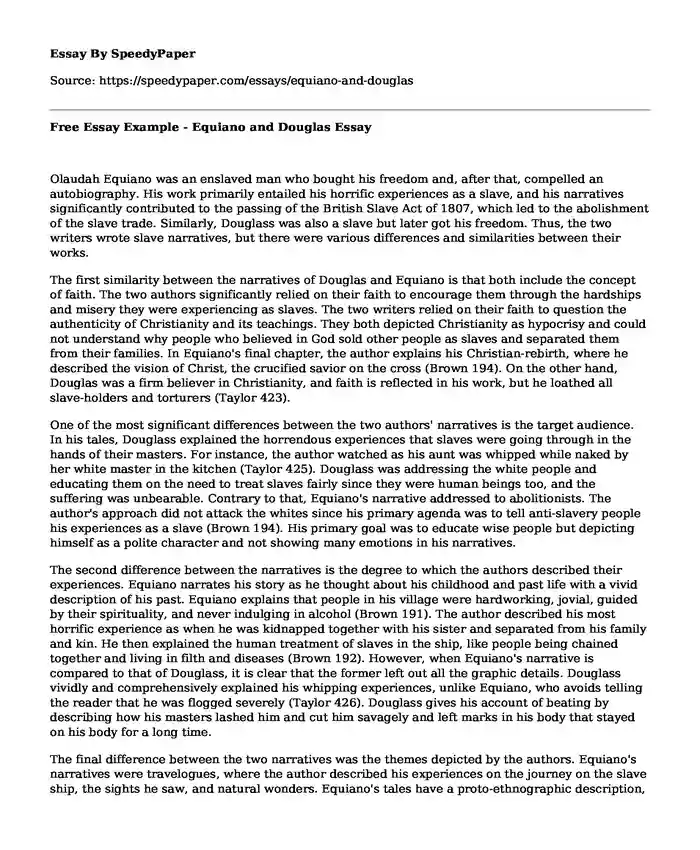Olaudah Equiano was an enslaved man who bought his freedom and, after that, compelled an autobiography. His work primarily entailed his horrific experiences as a slave, and his narratives significantly contributed to the passing of the British Slave Act of 1807, which led to the abolishment of the slave trade. Similarly, Douglass was also a slave but later got his freedom. Thus, the two writers wrote slave narratives, but there were various differences and similarities between their works.
The first similarity between the narratives of Douglas and Equiano is that both include the concept of faith. The two authors significantly relied on their faith to encourage them through the hardships and misery they were experiencing as slaves. The two writers relied on their faith to question the authenticity of Christianity and its teachings. They both depicted Christianity as hypocrisy and could not understand why people who believed in God sold other people as slaves and separated them from their families. In Equiano's final chapter, the author explains his Christian-rebirth, where he described the vision of Christ, the crucified savior on the cross (Brown 194). On the other hand, Douglas was a firm believer in Christianity, and faith is reflected in his work, but he loathed all slave-holders and torturers (Taylor 423).
One of the most significant differences between the two authors' narratives is the target audience. In his tales, Douglass explained the horrendous experiences that slaves were going through in the hands of their masters. For instance, the author watched as his aunt was whipped while naked by her white master in the kitchen (Taylor 425). Douglass was addressing the white people and educating them on the need to treat slaves fairly since they were human beings too, and the suffering was unbearable. Contrary to that, Equiano's narrative addressed to abolitionists. The author's approach did not attack the whites since his primary agenda was to tell anti-slavery people his experiences as a slave (Brown 194). His primary goal was to educate wise people but depicting himself as a polite character and not showing many emotions in his narratives.
The second difference between the narratives is the degree to which the authors described their experiences. Equiano narrates his story as he thought about his childhood and past life with a vivid description of his past. Equiano explains that people in his village were hardworking, jovial, guided by their spirituality, and never indulging in alcohol (Brown 191). The author described his most horrific experience as when he was kidnapped together with his sister and separated from his family and kin. He then explained the human treatment of slaves in the ship, like people being chained together and living in filth and diseases (Brown 192). However, when Equiano's narrative is compared to that of Douglass, it is clear that the former left out all the graphic details. Douglass vividly and comprehensively explained his whipping experiences, unlike Equiano, who avoids telling the reader that he was flogged severely (Taylor 426). Douglass gives his account of beating by describing how his masters lashed him and cut him savagely and left marks in his body that stayed on his body for a long time.
The final difference between the two narratives was the themes depicted by the authors. Equiano's narratives were travelogues, where the author described his experiences on the journey on the slave ship, the sights he saw, and natural wonders. Equiano's tales have a proto-ethnographic description, and he vividly explains what he saw during the journey (Brown 197). However, Douglas' primary theme in his narratives was "escape" and not travel (Taylor 431).
Works Cited
Brown, Matthew D. "Olaudah Equiano and the Sailor's Telegraph: The Interesting Narrative and the Source of Black Abolitionism." Callaloo 36.1 (2013): 191-201.
Taylor, Ordner W. "Horror, Race, and Reality." The Palgrave Handbook to Horror Literature. Palgrave Macmillan, Cham, 2018. 423-432.
Cite this page
Free Essay Example - Equiano and Douglas. (2023, Apr 09). Retrieved from https://speedypaper.com/essays/equiano-and-douglas
Request Removal
If you are the original author of this essay and no longer wish to have it published on the SpeedyPaper website, please click below to request its removal:
- Free Essay: The Importance of First Line Supervisors in Police
- Free Paper Example: Violence against Nurses
- Ethics Essay Example: All Abortions Are Selfish
- Essay Sample. Coaching Model Assignment
- Free Essay. The Sociological Review
- Essay Sample on Rural Education in America
- Paper Example. Social Stratification in the Handmaid's Tale
Popular categories





